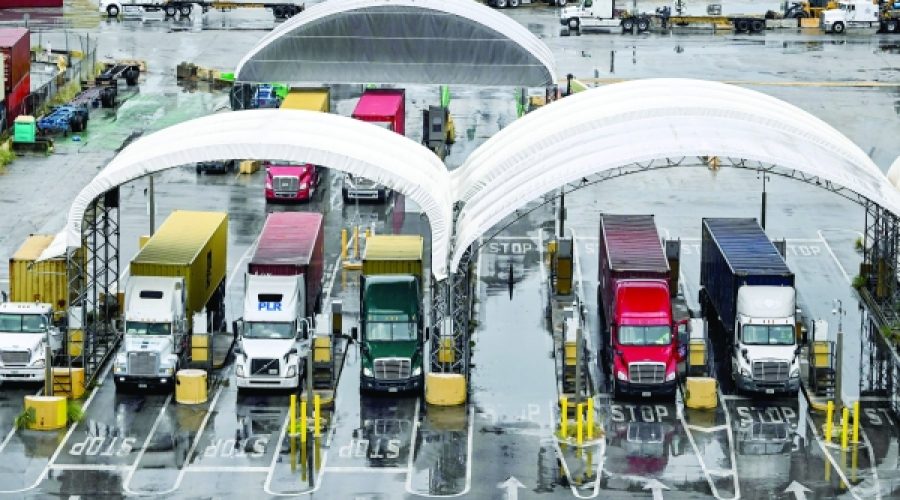الرسوم الجمركية الأمريكية الجديدة على الأدوية والشاحنات والأثاث: تداعياتها على المستوردين وبيئة الأعمال في عُمان
الرئيس الأمريكي دونالد ترامب يكشف عن رسوم جمركية جديدة على الواردات
أعلن الرئيس الأمريكي دونالد ترامب يوم الخميس عن فرض رسوم جمركية جديدة كبيرة على الواردات، بما في ذلك رسوم 100% على الأدوية ذات العلامات التجارية ورسوم 25% على الشاحنات الثقيلة، ومن المقرر أن تدخل حيز التنفيذ الأسبوع المقبل.
وصف ترامب هذه الإجراءات بأنها ضرورية لحماية قطاع التصنيع الأمريكي والأمن القومي. يأتي هذا الإعلان في أعقاب فرض رسوم جمركية سابقة على شركاء تجاريين مختلفين، وصلت إلى 50%، ورسوم مستهدفة على منتجات مثل الصلب. تُفاقم هذه التطورات التحديات التي تواجهها الشركات العالمية، مما يُفاقم اضطرابات سلاسل التوريد، وارتفاع التكاليف، وحالة عدم اليقين لدى المستهلكين الناجمة عن التوترات التجارية المستمرة. وأشار مجلس الاحتياطي الفيدرالي إلى أن هذه الرسوم تُسهم في ارتفاع أسعار المستهلكين في الولايات المتحدة، وتُلقي بظلالها على النمو الاقتصادي العالمي.
ردًا على ذلك، تراجعت أسواق الأسهم الآسيوية، لا سيما بين شركات الأدوية. مع ذلك، تعافت الأسهم الأوروبية من خسائرها الأولية وسط حالة من عدم اليقين بشأن نطاق الرسوم الجمركية الجديدة. وأشارت الإشارات المتباينة من العقود الآجلة للأسهم الأمريكية إلى أن المستثمرين لم يتأثروا إلى حد كبير بإعلان ترامب الأخير عن الرسوم الجمركية، وفقًا لمذكرة صادرة عن BMO Economics.
صرح بنك مونتريال (BMO) قائلاً: "إلى أن تظهر على الاقتصاد الأمريكي علامات توتر إضافية جراء الحرب التجارية، يبدو أن المستثمرين راضون عن التزام الهدوء والاستمرار في الاستثمار". لم يوضح ترامب ما إذا كانت الرسوم الجمركية الجديدة ستُضاف إلى الرسوم الجمركية الوطنية الحالية. وتضمنت اتفاقيات التجارة الأخيرة مع اليابان والاتحاد الأوروبي والمملكة المتحدة بنودًا لوضع حد أقصى للرسوم الجمركية على منتجات محددة، مثل الأدوية.
تهدف اتفاقية تجارية أولية غير ملزمة بين الاتحاد الأوروبي والولايات المتحدة إلى الحد من التعريفات الجمركية عند 15%. إلا أن ترامب لم يوقع رسميًا بعد أمرًا تنفيذيًا لتأكيد هذه الاتفاقية. وقد أشارت المفوضية الأوروبية يوم الجمعة إلى وضوح الشروط، مما يضع سقفًا شاملًا للتعريفات الجمركية عند 15%. وأشار المفاوض التجاري الياباني، ريوسي أكازاوا، إلى أن اليابان لديها اتفاقية مماثلة تضمن ألا تتجاوز معدلات تعريفاتها الجمركية تلك المطبقة على الاتحاد الأوروبي.
أوضح ترامب أن التعريفة الجمركية 100% على الأدوية ذات العلامات التجارية ستُطبق فقط على الشركات التي لم تُنشئ بعد منشآت تصنيع في الولايات المتحدة. وتعهدت العديد من شركات الأدوية باستثمارات كبيرة في عملياتها الأمريكية، حيث أكدت شركة روش مؤخرًا أن إحدى وحداتها الأمريكية قد بدأت بناء منشأة جديدة. ولم تستجب شركة الأدوية المنافسة نوفارتس، التي التزمت هي الأخرى باستثمارات كبيرة في الولايات المتحدة، لطلبات التعليق.
وتوقعًا لهذه التعريفات، زادت أيرلندا، حيث تعمل العديد من مصانع الأدوية المملوكة للولايات المتحدة، صادراتها إلى الولايات المتحدة، حيث ارتفعت المنتجات الكيميائية والصيدلانية بمقدار 536% على أساس سنوي إلى $27.9 مليار في الأشهر السبعة الأولى من عام 2025، وفقًا لمكتب الإحصاء المركزي في أيرلندا.
في إطار برنامجه، جدد ترامب التزامه بإنعاش صناعة الأثاث الأمريكية بفرض تعريفة جمركية 50% على واردات خزائن المطبخ وأحواض الحمامات، وتعريفة 30% على الأثاث المنجد. وستدخل هذه التعريفات حيز التنفيذ في الأول من أكتوبر. وتُعتبر هذه الخطوة جزءًا من انتقال إدارة ترامب إلى أسس قانونية راسخة لإجراءاتها التجارية، نظرًا للتحديات القانونية المستمرة المحيطة بسياساته الجمركية العالمية.
هذا الأسبوع، بدأ ترامب أيضًا تحقيقات في آثار معدات الوقاية الشخصية، والمستلزمات الطبية، والروبوتات، والآلات الصناعية على الأمن القومي. وكان قد فرض سابقًا رسومًا جمركية على الفولاذ، والألمنيوم، والمركبات الخفيفة، والنحاس، متذرعًا باعتبارات الأمن القومي.
وفقًا لمجموعة تجارة الأدوية الأمريكية، يُنتج أكثر من نصف مكونات الأدوية المستخدمة في الولايات المتحدة، والبالغة قيمتها $85.6 مليار دولار أمريكي، محليًا، بينما يُستورد الباقي من أوروبا ودول أخرى حليفة. في عام 2024، بلغت واردات الأثاث إلى الولايات المتحدة $25.5 مليار دولار أمريكي، بزيادة قدرها 7% عن العام السابق، منها حوالي 60% من فيتنام والصين، وفقًا لما ذكرته مجلة Furniture Today.
أعربت نغوين ثي ثو هواي، من جمعية الأخشاب والحرف اليدوية الفيتنامية، عن قلقها إزاء الرسوم الجمركية الإضافية، مشيرةً إلى أن الكثيرين في هذا القطاع وجدوا هذه الخطوة غير متوقعة وغير عادلة. منذ عام 2000، انخفضت فرص العمل في قطاعي الأثاث والنجارة في الولايات المتحدة بنحو النصف، لتصل الآن إلى حوالي 340 ألف وظيفة.
أشارت شركة إنتر إيكيا إلى أن حوالي 10% من منتجات إيكيا المباعة في الولايات المتحدة تُصنّع في أمريكا الشمالية والجنوبية. قد تؤدي زيادة الرسوم الجمركية على المركبات التجارية إلى ارتفاع تكاليف النقل في وقت يسعى فيه ترامب إلى الحد من التضخم، مما يؤثر بشكل خاص على السلع الاستهلاكية مثل البقالة. من المتوقع أن تستفيد شركات أمريكية مثل بيتربيلت وكينورث المملوكتين لشركة باكار، بالإضافة إلى فريتلاينر، من الرسوم الجمركية الجديدة على الشاحنات الثقيلة، بينما انخفضت أسهم شركتي دايملر تراك وتراتون الألمانيتين لتصنيع الشاحنات عقب الإعلان.
تحليل خاص من عمانت | تصفح سوق عُمان
الأخيرة رسوم جمركية شاملة على الواردات أعلنت إدارة ترامب عن إنشاء كليهما فرص و المخاطر للشركات في عُمان. مع مواجهة سلاسل التوريد العالمية لانقطاعات، قد يجد المصدرون العُمانيون، وخاصةً في قطاعي الأدوية والتصنيع، أسواقًا مفتوحة في الولايات المتحدة الأمريكية نتيجةً لتغير ديناميكيات التجارة؛ إلا أن ارتفاع تكاليف المركبات الثقيلة قد يضغط على قطاعات النقل ويرفع الأسعار محليًا. ينبغي على المستثمرين الأذكياء إعادة تقييم سلاسل التوريد الخاصة بهم والسعي إلى... الشراكات الاستراتيجية لتخفيف آثار هذه التعريفات الجمركية مع التركيز على القطاعات المتنامية الأقل تأثراً بالسياسات الأميركية.



